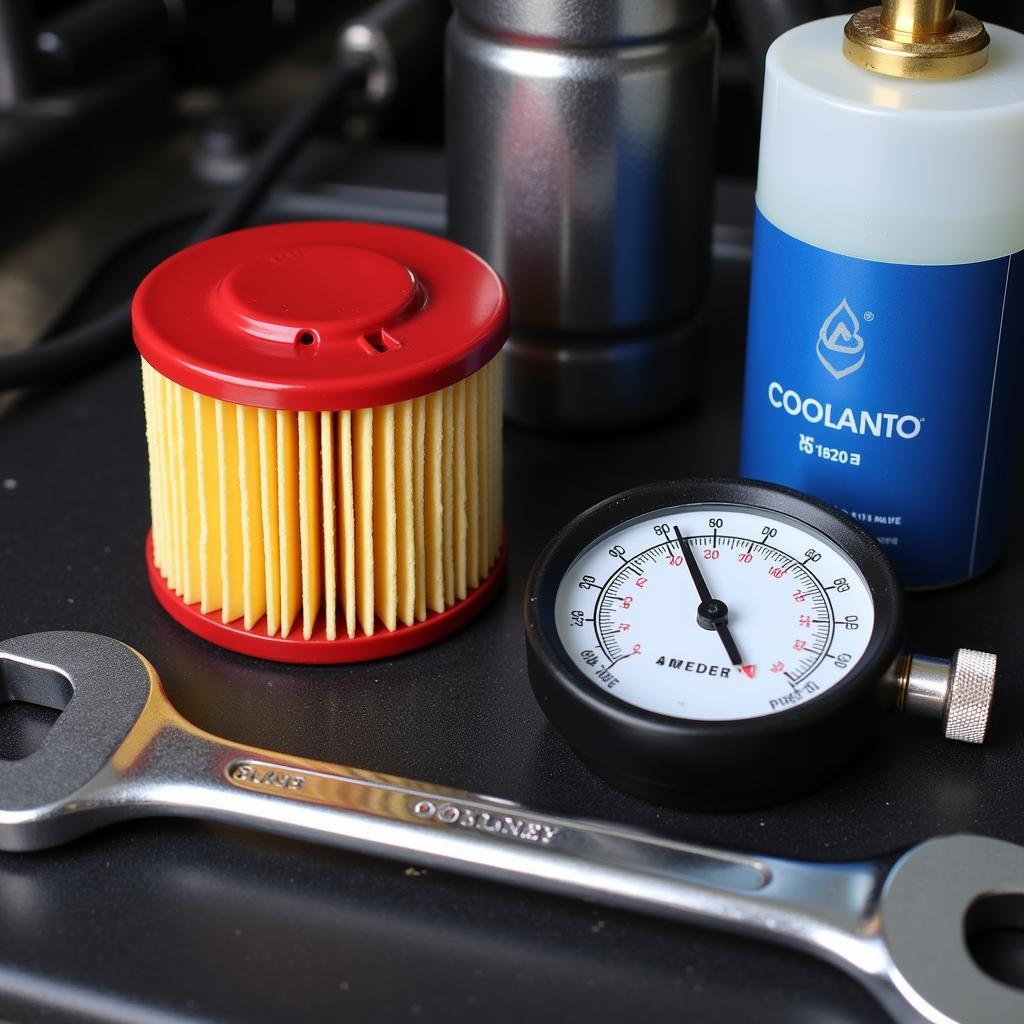What Does General Service Car Mean?
When it comes to car maintenance, “general service” is a term often thrown around. But what does it actually mean for you and your car? Simply put, a general service car checkup is like a routine health check for your vehicle. It’s a series of inspections, checks, and minor adjustments designed to keep your car running smoothly and identify potential issues before they become major headaches.
Understanding the Importance of a General Service Car
Think of a general service as a preventative measure. Just like you wouldn’t wait until you’re seriously ill to see a doctor, you shouldn’t wait for your car to break down before giving it some TLC. Regular servicing helps catch problems early on, saving you money on costly repairs in the long run.
 Mechanic inspecting a car during a general service checkup
Mechanic inspecting a car during a general service checkup
What’s Typically Included in a General Service Car?
While the specifics might vary slightly depending on your car’s make, model, and mileage, a general service typically includes:
- Oil & Filter Change: This is essential for the engine’s health, as it lubricates moving parts and prevents excessive wear and tear.
- Fluid Top-Ups: This includes checking and topping up essential fluids like coolant, brake fluid, power steering fluid, and windshield washer fluid.
- Tire Pressure and Condition Check: Ensuring your tires are inflated to the correct pressure is crucial for safety, fuel efficiency, and tire longevity. The mechanic will also check for signs of wear and tear.
- Brake Inspection: Your brakes are critical for safety. The mechanic will inspect the brake pads, discs, and lines for wear and tear.
- Lights Check: All exterior and interior lights will be checked to ensure they are functioning correctly.
- Battery Test: The battery’s voltage will be checked to ensure it’s strong enough to start your car reliably.
- Visual Inspection: The mechanic will give your car a once-over, looking for any obvious signs of damage, leaks, or other potential issues.
How Often Should I Get a General Service?
As a good rule of thumb, aiming for a general service car appointment every 6 months or 5,000-7,500 miles is a safe bet. However, it’s always best to consult your owner’s manual for specific recommendations for your vehicle.
The Benefits of Regular Car Servicing
The benefits of regular car servicing extend far beyond just keeping your car running. Here are just a few advantages:
- Safety: Regular maintenance ensures all safety-critical components like brakes, tires, and lights are in optimal working order.
- Reliability: You’re less likely to experience unexpected breakdowns or issues when your car is regularly serviced.
- Resale Value: A well-maintained car with a complete service history will command a higher resale price when you decide to sell it.
- Fuel Efficiency: A properly tuned engine with fresh oil and clean filters will operate more efficiently, saving you money on fuel costs.
Beyond the Basics: Tailoring Your Car Service
While a general service covers the essentials, you can often opt for additional checks or services depending on your car’s age, mileage, or your specific concerns. These might include:
- Timing Belt/Chain Inspection/Replacement
- Air Filter Replacement
- Spark Plug Replacement
- Coolant Flush
- Transmission Fluid Check/Change
Don’t Neglect Your Car’s Health
Getting a regular general service is a small investment that can save you time, money, and stress in the long run. By proactively taking care of your car, you’ll enjoy peace of mind knowing you’re driving a safe and reliable vehicle.
Frequently Asked Questions about General Service Car
1. How much does a general service car typically cost?
The cost can vary depending on your car’s make and model, your location, and the specific services included.
2. Can I service my own car?
While some routine maintenance tasks can be done at home by experienced individuals, it’s generally recommended to leave servicing to qualified mechanics, especially for more complex tasks.
3. How do I choose a reputable car service center?
Look for certifications, read online reviews, and ask friends or family for recommendations.
4. What happens if I skip a general service?
While skipping one service might not be catastrophic, consistently neglecting maintenance increases the risk of more severe and expensive problems down the line.
5. What is the difference between a general service and a full service?
A full service is more comprehensive and includes additional checks and replacements compared to a general service.
Need help finding a reliable mechanic or understanding your car’s service needs? Contact our team at WhatsApp: +1(641)206-8880, Email: [email protected]. We’re here to help 24/7!

